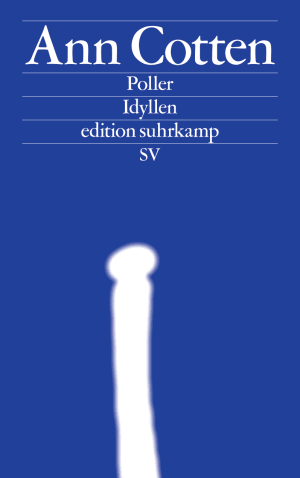Lyophilia
Ann Cotten has grown up, a fact that catapults us somewhat into the future. She claims that all she is interested in now is a constructive approach to a functioning, reasonable life for everyone (if possible). A philanthropic robot, so to speak. But her strangely labyrinthine yet overly respectful way of confronting problems still shows traces of the experiences she gathered as a young poet.
In Proteus both the eternally young protagonist and his lover, a successful...
Ann Cotten has grown up, a fact that catapults us somewhat into the future. She claims that all she is interested in now is a constructive approach to a functioning, reasonable life for everyone (if possible). A philanthropic robot, so to speak. But her strangely labyrinthine yet overly respectful way of confronting problems still shows traces of the experiences she gathered as a young poet.
In Proteus both the eternally young protagonist and his lover, a successful Slovenian politician with two children, are exported into a parallel universe in which any thought at all becomes reality. In the meantime, however, the aging inhabitants of the settlement asteroid Amore (KAFUN), which went bankrupt shortly after its foundation, continue to hold to clichés and running gags. They hope to discover an end to grief, which proves to be a greater danger than being without the Internet, cosmic radiation or humanitarian instant noodles combined. However, an Antigonelike mission saves the heroes from going to ground in their own survival.
A collection of stories like a shot in the knee. What Ann Cotten has somewhat cheekily referred to as »science fiction on a Hegelian basis« over the last few years has finally arrived. Lyophilia is like the special effects in a Tarkovsky film: a formulation held up to the real world, where, once the possibly realistic has come to an end, hot and throbbing emotion bursts forth.
»We wanted to be better, but at the same time didn’t want to change.«
»Ann Cotten is bursting with intellectual power and creativity.« Hanna Engelmeier, taz. die tageszeitung
»[...] simply great literature.« Anja Kümmel, DIE ZEIT
»For the great work of dissolving [supposedly cosmopolitan] expressions into speculation, at some point German-language literary historiography should get used to the term ›Cottenesque‹; it will need it.« Dietmar Dath, Frankfurter Allgemeine Zeitung
»Ann Cotten‘s style is what’s exceptional about this book. She oscillates masterfully between scientific speech and everyday conversations imbued with Anglicisms. Thereby, her style maintains its freshness through the utmost precision and unpredictability […]« Joshua Schößler, Frankfurter Rundschau
»With her new book, Ann Cotten confirms her reputation of following a literary avant-garde and a passion for experimenting that moves, albeit in unconventional, eccentric and simultaneously highly original texts, straight towards the future.« Jörg Schieke, MDR
»Cotten, the currently most fascinating German-language author […] For more than a decade she has been writing successful books that concern people directly – without immediately revealing why that is so.« Malte Spitz, Spex Magazin 4/2019
»Drugs, inebriation, economics, poetics, philosophy – everything Ann Cotten touches turns into Ann Cotten!« ORF
»Politics, philosophy and aesthetic calculation come together in oscillating structures which are as engaged in revolt as they are in beauty« From the decision of the jury for the Hugo-Ball Prize 2017
»Ann Cotten is bursting with intellectual power and creativity.« Hanna Engelmeier, taz. die tageszeitung
»[...] simply great literature.« Anja Kümmel, DIE ZEIT
»For the great work of dissolving [supposedly cosmopolitan] expressions into speculation, at some point German-language literary historiography should get used to the term ›Cottenesque‹; it will need it.« Dietmar Dath, Frankfurter Allgemeine Zeitung
»Ann Cotten‘s style is...
Persons
Ann Cotten
Ann Cotten, born in Iowa in 1982, grew up in Vienna. She has been living in Berlin since 2006. In 2011, she spent four months in Nagoya, Japan. For her first poetry collection, Fremdwörterbuchsonette (2007), she was awarded the Reinhard Preissnitz Prize and the Clemens Brentano Prize for Literature of the City of Heidelberg. For Florida-Räume (2010) she received the Hermann Hesse Literature Prize. In 2014, Ann Cotten was awarded the Adelbert von Chamisso Prize; in 2015, she was the first recipient of the newly founded Klopstock Prize for Contemporary Literature. In 2017, she was awarded the Hugo-Ball-Prize for her oeuvre.
Ann Cotten, born in Iowa in 1982, grew up in Vienna. She has been living in Berlin since 2006. In 2011, she spent four months in Nagoya, Japan....
OTHER PUBLICATIONS

Bollards

Ancestral Destructions
Is it the ancestors that are making the air heavy, crowding around the island? In the form of people, clouds, winds, fish, birds of the mountains, birds of the coast, migratory birds and seabirds that come to Hawaii to flirt, lay eggs, rest and then retreat back to the open sea?
Ancestral Destructions deals with the narrator's spiritual and material prehistory: that is...

Banned!
Billowing palm trees, a rustle in the celery, a tiger disappears, an atomic bomb detonates in the distance, and a consciousness starts moving backwards. The latter belongs to a TV presenter who has been banished to a deserted island due to numerous instances of grave misconduct, equipped with (as per her own choice) a knife, a grindstone and Meyers...

The Quivering Fan
»I had several lovers into whose eyes, like in tea bowls, I wanted to immerse myself...
Previously published in the respective language / territory; rights available again: Netherlands (Leesmagazijn)

Florida-Spaces
»Want to earn money writing? Want to disclose your most intimate thoughts?« Naturally, people reacted to our invitation in the classifieds and sent in texts. Some of them have been gathered in the...
Serbia (Kontrast)

Sonnets from the Dictionary of Borrowed Words
Weighed down by few associations, artificial, new, or existing in our everyday language merely temporarily – loan words seem to apologise for their existence: »I’m only fulfilling a conceptual function, occupying a job for which there’s no qualified German available at the moment.«
Could they be serious? Ann Cotten employs them in the rattling machines of thought...
